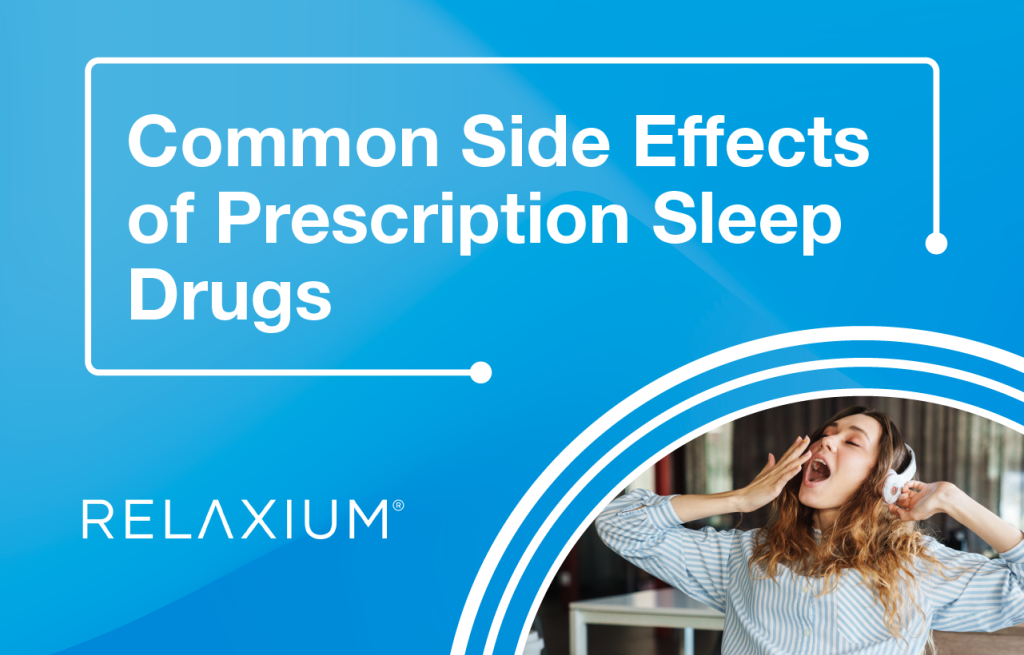Unfortunately, most of us are far too familiar with the dreaded sleeplessness that occurs at night. In an effort to combat this, we often treat our sleepless nights with prescription sleep drugs. Sleeping pills treat sleep disorders such as insomnia, by making you feel drowsy and relaxed. Some sleep drugs even silence the area of our brain that keeps us alert, in an effort to aid in our sleep. Most prescription sleep drugs often come with side effects. These side effects can vary from mild to very severe, and it’s important to know them before taking these medications. According to Time, around 4% of Americans take some sort of sleep drug to get to sleep each night. While that number may seem small, that’s roughly nine million people! It’s important to know the dangers and facts of sleep medicine before taking it.
Mild Side Effects of Prescription Sleep Drugs
When taking prescription sleep medications, often the side effects that you may experience are mild. But, they are still something you don’t want to be dealing with regularly. The most commonly reported side effects, according to The Sleep Foundation, include:
- Burning or tingling sensation in hands, arms, feet, or legs
- Changes in appetite
- Constipation
- Diarrhea
- Dizziness or lightheadedness
- Drowsiness during the day
- Dry mouth or throat
- Gas
- Headache
- Nausea
- Mental impairment the following day
- Difficulty paying attention
- Difficulty remembering things
- Stomach pain
- Impaired balance
- Uncontrolled balance
- Uncontrollable shaking
- Weird dreams or nightmares
- Weakness
While these are all considered “mild” side effects of prescription sleep aids, they are definitely things that you want to avoid. You should be well aware of these side effects before indulging in any form of prescription sleep aid.
Severe Side Effects of Prescription Sleep Drugs
Parasomnias
According to WebMD, parasomnias are types of disturbing disorders that can happen just before you fall asleep, while you are sleeping, or as you are waking up. There are various different types of parasomnias that can occur due to prescription sleep drugs, including: nightmares, night terrors, sleepwalking, sleep eating, sleep talking, sleep paralysis, and irregular heart rhythms. The most common parasomnias that occur are sleepwalking and sleep eating disorders. There are multiple signs that can lead to the diagnosis of sleepwalking. Some common symptoms of being in a sleepwalking state include:
- Open eyes with a glassy appearance
- Blank face
- Incoherent speech
- Minimal response, physically and verbally
- Zero recollection of what occurred upon waking up
Sleep eating is similar to sleepwalking. You may get up in the middle of the night and eat, without any recollection of it the morning after. This usually occurs almost every night in persons who struggle with the disorder.
Tolerance
If you are taking prescription sleeping pills over a prolonged period of time, you can quickly build up a tolerance to the drugs. This means that overtime, you will have to up your dosage of sleep medication. According to Everyday Health, if you take a high enough dose, this can lead to depressed breathing while you sleep, which can cause death. That’s why it’s extremely important to make sure you are only taking sleeping medications for one to two weeks at a time. You can run into many problems with side effects if you use them longer than seven to ten days.
Dependency
Unfortunately, dependency is another severe side effect that often occurs when taking sleep medications. Prescription sleeping medications are often prescribed for only a short period of time, but can be abused easily. If you find yourself relying on sleeping pills to get to sleep each night, you may be struggling with dependency. According to Verywell Mind, dependency can be physiological and psychological. Physiological dependence is often marked by withdrawal symptoms when the medication is stopped. Psychological dependence reflects a perceived need that one cannot manage without medication. Common symptoms one might experience if they are struggling with sleep medication dependence are: body spasms, seizures, insomnia, delirium, anxiety, cravings, irritability, depression, confusion, hallucinations, sweating, increased heart rate, hand tremors, vomiting, and nausea. Dependency on sleeping pills, although common, is very dangerous.
Allergic Reactions
Allergic reactions can happen with any medications, especially sleeping medications. Common signs that can occur if you are having an allergic reaction to your sleep medication may be rashes, hives, itching, skin that is red, swollen, or blistered, wheezing, tightness in the chest or throat, trouble breathing, swallowing, or talking, unusual hoarseness, or swelling of the face, lips, mouth, tongue, or throat. If any of these symptoms occur, you should stop taking the medication immediately and contact your doctor.
Relaxium Sleep
One of the best things about Relaxium Sleep is that it’s non-prescription, drug-free, and non-habit forming. This means that it doesn’t come with any of the harsh side effects that most other prescription sleeping pills often do. You can rest assured knowing that you won’t have to deal with these side effects, and knowing that you can count on Relaxium Sleep’s quality and effectiveness. Relaxium Sleep is made with premium ingredients, such as ashwagandha, chamomile extract, melatonin, magnesium citrate, and more. These ingredients are 100% vegan, gluten-free, and made in the USA. Relaxium prides itself on being completely safe! Allow it to help you fall asleep faster, stay asleep longer, and wake up feeling refreshed.
To restful and healthy days ahead.
The Relaxium Team
*These statements have not been evaluated by the Food & Drug Administration. This product is not intended to diagnose, treat, cure, or prevent any disease.
Sources:
[1] Are Sleeping Pills Safe? (Time.com)
[2] Side Effects of Sleep Medication (sleepfoundation.org)
[4] The Risk of Taking Sleeping Pills (everydayhealth.com)[5] What is a Sleeping Pill Addiction? (verywellmind.com)

